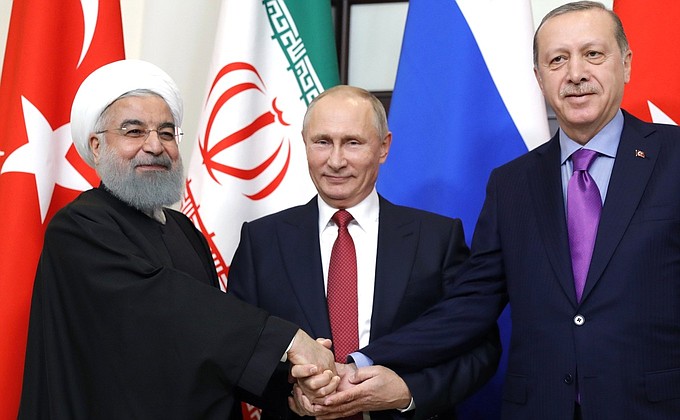By Alex Day
Tensions have risen in recent weeks between Trump’s U.S.A. and Iran, resulting in widespread fears of a military conflict sensationalized as ‘World War Three’.
Following an Iranian militia’s storming of a U.S. embassy in Baghdad, Uncle Sam responded with an aggressive ‘flawless precision strike’ that assassinated Iran’s top general Qassem Soleimani, who was subsequently branded the ‘number one terrorist anywhere in the world’ by Trump in typical hyperbolic fashion. The Iranian government has since issued a statement promising ‘fierce revenge’, which was delivered by twenty-two rockets being fired at U.S.-Iraqi military bases last week. Alongside the public’s chants of ‘death to America’ at the public funeral of Soleimani, the vast turnout for which resulted in a stampede in which at least fifty were killed, recent events appear to starkly forewarn a full-blown war between the United States and Iran. Extremely punishing sanctions have since been issued on Iran in an attempt to asphyxiate the country economically. ‘Our great American forces are prepared for anything,’ Trump stated. ‘Our missiles are big, powerful, accurate, lethal and fast’.
In times of escalating tension, the narrative is easily controlled by state authorities – but what is really going on here? What real issues lie beneath the apparent conflict between tyranny and freedom? The answer, I’m afraid, is disappointingly typical.
Oil.
At this point, it’s far from tin-foil hat to claim that crude oil resources are the primary driver of America’s military operations. In any case, there is massive corporate interest involved in the situation. Arms dealers, with the U.S. and Britain spearheading sales, have enjoyed a £14 billion boost from the Iran crisis. The invasion of Iraq, justified by the supposed (and since debunked) existence of weapons of mass destruction, yielded large profits to American oil companies such as Halliburton, far from coincidentally led by its C.E.O. Dick Cheney, the architect of the invasion, prior to his vice presidency. The company was awarded some of the largest state contracts of the Iraq War. War with Venezuela has also came close to becoming a reality; likely another attempt by Uncle Sam to snatch the country’s oil reserves which are (not coincidentally) the largest on earth.
In light of this pattern, it seems suspicious this escalation of aggression towards Iran comes a mere month after the discovery of a large oil field with an estimated yield of 53 billion barrels of crude oil, which appears to coincide with the Iranian’s apparent need for freedom and democracy delivered by America.
The 2020 Election.
For President Trump, war with Iran is a strategic move. For millennia, rulers have used fear of an external enemy to create internal harmony; for example the Greco-Persian Wars, or more recently NATO and the European Union forming a bloc to prevent the expansion of Soviet Communism into Europe.
Trump’s situation does not bode well – facing re-election with low approval ratings alongside a daunting impeachment trial in the Senate over allegations of blatant abuse of power. Uncannily similar to his accusation of Obama in 2012, only a ‘weak and ineffective’ president would start a war with Iran to get re-elected. War appeals to patriotism and nationalism, ideologies upon Trump effectively built his political brand – in the case of Iran, it befits his Islamophobic rhetoric.
Politics aside, Trump’s hyperbolic language alongside his undeniable confidence and charisma makes him a far more attractive candidate for re-election in a purely military context than, say, Andrew Yang or Bernie Sanders, whose liberal politics and overall rhetoric of forgiveness and acceptance dwell in comparison to Trump’s tough language that constructs an unrelenting external enemy.
It appears that Trump has been working on escalating Iranian tensions for some time, immediately withdrawing from the nuclear non-proliferation treaty Obama worked hard to forge with the country near the beginning of his presidency. By creating chaos, Trump will trick the American people into re-electing him for his strong-man qualities, which comfortably befit the demeanour of a war leader.
International Politics.
There will, despite the media’s sensationalizing, be no World War Three. Despite the fact that the Iranian joint naval military exercises with Russian and Chinese forces in recent weeks understandably lend credence to widespread fears, Russia and China have too much to gain by not entering the conflict. Each superpower is bogged down in a precarious dilemma regarding expansion; Russia cannot further its ambitions in Ukraine due to American sanctions and the threat of military response in Europe. Similarly, China’s South China Sea ambitions have been halted by the geopolitical checkmate of its proximity to U.S. allies Japan, South Korea and the Philippines and a similar threat of American military response.
If the U.S. invades Iran, Russia and China could bargain with America – an allowance of their respective expansion into Ukraine and the South China Sea, or even just a leniency on Russian sanctions and an end to the U.S.-China trade war, in return for not supporting the regime in Tehran. America’s leader and author of The Art of the Deal will be fully aware of these bargaining opportunities and the various diplomatic ways to prevent a would-be World War.
What to take from all this?
If you’re to take anything from my two cents on the matter, it is to always be critical of what you are told.
Trump’s rhetoric of constructing Iran as a regime of terrorism and tyranny is, although somewhat true, used purely to incite nationalism that will favour his re-election. Secondly, don’t be scared – a climate of fear also befits Trump and his strong-man qualities. Fear is a method of control, and a critical discussion of the situation shows the unlikeliness of an inter-superpower ‘World War Three’. America’s interest is not freedom; it is finance – it is not the instillation of democracy, but the extension of influence and power.
Question everything, and listen to no single source, but a combination of many and find the middle ground.

